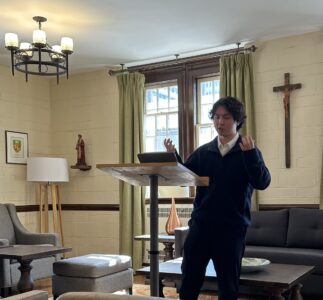From using a sack of potatoes as a visual aid to making cultural references to works as disparate as Plato’s Republic and television’s Desperate Housewives, the recent St. Michael’s College Research Colloquium was as entertaining as it was informative.
The annual event, held this year on March 23, showcases the research and presentation skills of students studying at St. Michael’s. The event mirrors the experience of an academic conference, where students write and submit an abstract as part of the application process and then present their research to an audience, field questions from attendees, and receive feedback from faculty respondents.

“The purpose of the event is to encourage fruitful collaboration between the student population and St. Mike’s faculty and fellows,” says Dr. Bernadette Guthrie, Interim Director of the Junior Fellows Program and organizer of the day.
“The Colloquium affords undergraduate students the opportunity to present their work publicly to members of the larger academic community. This experience also offers an invaluable experience for those students planning to pursue graduate studies.”
The day-long colloquium, which saw participation from five faculty members, featured two student panels that addressed the theme of “Labour, Leisure, and the Good Life”. In the morning panel on “GenderLeisure/Gendered Labour,” Elinor Egan (a double major in Christianity & Culture and Slavic Languages and Culture), presented on “‘Women’s Work’ through the Lens of the Christian Imagination”, while Cinema Studies major Brian Tin shared his paper, “Let’s Talk Cooking: Gendered Marketing for the Nintendo DS and User-fying Women Gamers.”
The afternoon session saw three papers presented on the theme of “The Work of Art, the Work of God, and the Work of Contemplation.” English Literature major Bridget Bowles spoke on “Withstanding the Loss of Beauty and Dignity: Bede, Caedmon, and the Labour of Poetry in Early Modern England; Mediaeval Studies major Para Babuharan offered a paper titled “Opus Dei: Worship and Work in the Rule of St. Benedict”; and Hoda Sadek, currently studying Political Science, Philosophy and History, delivered a paper titled “Enlightenment: The Importance of Outward Contemplation for a Good Life.”
St. Michael’s Junior Fellows also played a role in the day, developing this year’s theme and helping draft the language of the Call for Papers. They adjudicated the submissions, grouped the papers into panels, and helped locate respondents. Two junior fellows, Dang Pham and Joseph Dattilo, served as moderators for the student panels.
For Tin, whose research focussed on gendered video game marketing, “the colloquium could not have been timelier.” He had learned about the event from his independent project supervisor, Prof. Felan Parker. Noting that his goal had always been to publish or present his work somewhere, he took the 40-page independent study project and focused on two sections, creating a new, shorter paper for the event.
“The version I presented at the colloquium was a mixture of two parts (out of the total seven) of the original paper. …Writing a version for the colloquium did make me think about and articulate my arguments more carefully.”
The day began with a keynote address – “Irish Lumpers: Appetite and Political Economy Before the Great Famine”—delivered by Prof. Padraic Scanlon, an associate professor in the University of Toronto’s Centre for Industrial Relations and Human Resources and the Centre for Diaspora & Transnational Studies. Scanlon, who is a Senior Fellow at St. Michael’s, gave a lively talk in which he used a sack of potatoes to challenge figures and stereotypes about the pre-famine Irish.
The day concluded with a faculty roundtable on Labour and Leisure in the Intellectual Life.
“I hope students come away from the event with a sense of confidence in their own role as budding scholars and in their ability to develop and refine their ideas through the process of conversation and critique,” says Guthrie. “I also hope that the Colloquium served as a site of intellectual friendship, one that afforded students the opportunity to forge connections with faculty and fellows beyond the classroom.”
